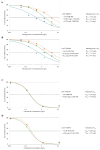Expanded Gram-Negative Activity of Marinopyrrole A
- PMID: 40137776
- PMCID: PMC11946689
- DOI: 10.3390/pathogens14030290
Expanded Gram-Negative Activity of Marinopyrrole A
Abstract
The rise of bacterial infections is a global health issue that calls for the development and availability of additional antimicrobial agents. Known for its in vitro effects on Gram-positive organisms, the drug-like small molecule marinopyrrole A was re-examined for the potential of broader efficacy against a wider array of microbes. We uncovered selective efficacy against an important subset of Gram-negative bacteria from three genera: Neisseria, Moraxella, and Campylobacter. This susceptibility is correlated with the absence of canonical LPS in these specific Gram-negative species, a phenomenon observed with other hydrophobic anti-microbial compounds. Further, when exposed to molecules which inhibit the LpxC enzyme of the LPS synthesis pathway, previously resistant LPS-producing Gram-negative bacteria showed increased susceptibility to marinopyrrole A. These results demonstrate marinopyrrole A's efficacy against a broader range of Gram-negative bacteria than previously known, including N. gonorrhea, a species identified as a priority pathogen by the WHO.
Keywords: antibacterial; bacterial infections; marinopyrrole A; susceptibility screening.
Conflict of interest statement
The authors declare that they have no competing interests.
Figures


References
MeSH terms
Substances
Grants and funding
LinkOut - more resources
Full Text Sources
Medical
Molecular Biology Databases

